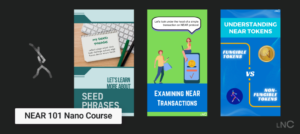Init once
Make sure you check that state doesn’t exists in init using
assert!(!env::state_exists(), "The contract is already initialized");
Prevent Default
By default near_sdk allows contract to be initialized with default state. Usually, if you have a constructor, you want to prevent default state initialization.
impl Default for Contract {
fn default() -> Self {
env::panic(b"The contract should be initialized before usage")
}
}
Public vs private methods
pub fn makes a method public and exposes it in a contract. It means anyone can call it. fn makes the method private and it’s not exposed from the contract. No one can call it directly. It can only be called within a contract directly (not through a promise).
Private callbacks
If you’re using callbacks, makes sure you check the caller.
assert_eq!(env::current_account_id(), env::predecessor_account_id(), "Can only be called within a contract");
Callbacks have to be public methods.
JSON types
NEAR currently expects contracts to support JSON serialization. JSON can’t handle large integers (above 2**53 bits). That’s why you should use helper classes from the json_types in near_sdk for u64 and u128. We provide types U64 and U128, that wraps the integer into a struct and implements JSON serialization and deserialization as a base-10 strings.
E.g.
pub fn add(&self, a: U128, b: U128) -> U128 {
(a.0 + b.0).into()
}
View vs Change method
By default, near_sdk assumes that the method is a view if it has &self and method is change if it has &mut self. View methods usually don’t have ability to change state and have limited context. Change methods will save the modified state back to the contract.
STATE storage key
The contract will save the main structure state under the storage key STATE. Make sure you don’t modify it e.g. through collection prefixes or raw storage access.
Enable overflow checks
It’s usually helpful to panic on integer overflow. To enable it, add the following into your Cargo.toml file:
[profile.release]
overflow-checks = true
Use assert! early in the method.
Try to validate the input, context, state and access first before making any actions. This will safe gas for the caller to fail earlier.
Use env::log
Use logging for debugging and notifying user. When you need a formatted message, you can use the following:
env::log(format!("Transferred {} tokens from {} to {}", amount, sender_id, receiver_id).as_bytes());
Return Promise
If your method makes a cross-contract call, you may want to return the Promise that the contract creates. It allows the caller to wait for the result of the promise instead of the returning the result immediately. Because if the promise fails for some reason, the caller will not know about this or the caller may display the result earlier.
E.g.
pub fn withdraw(&mut self, amount: U128) -> Promise {
Promise::new(self.owner_id.clone()).transfer(amount.0)
}
Updated: June 10, 2021


